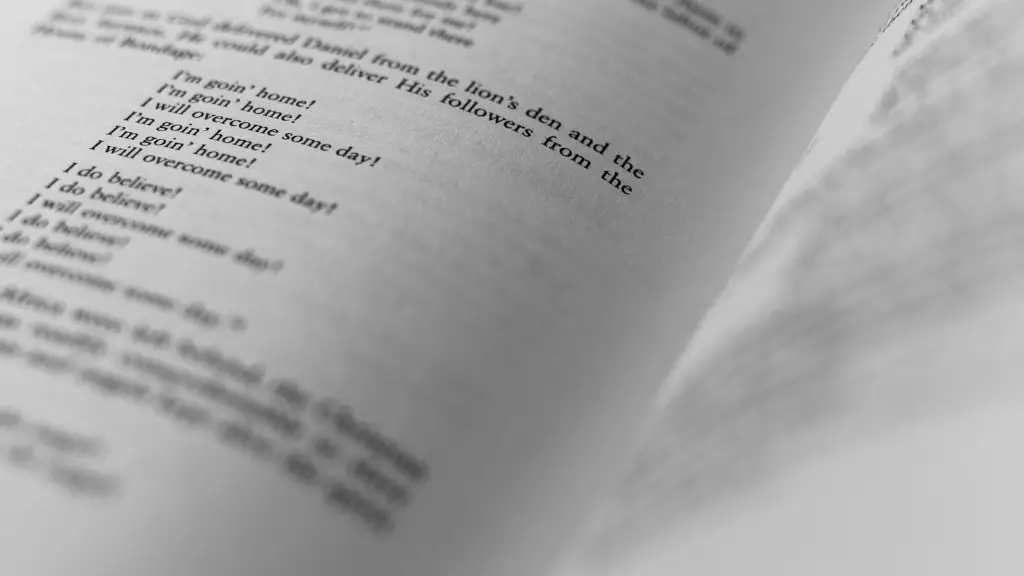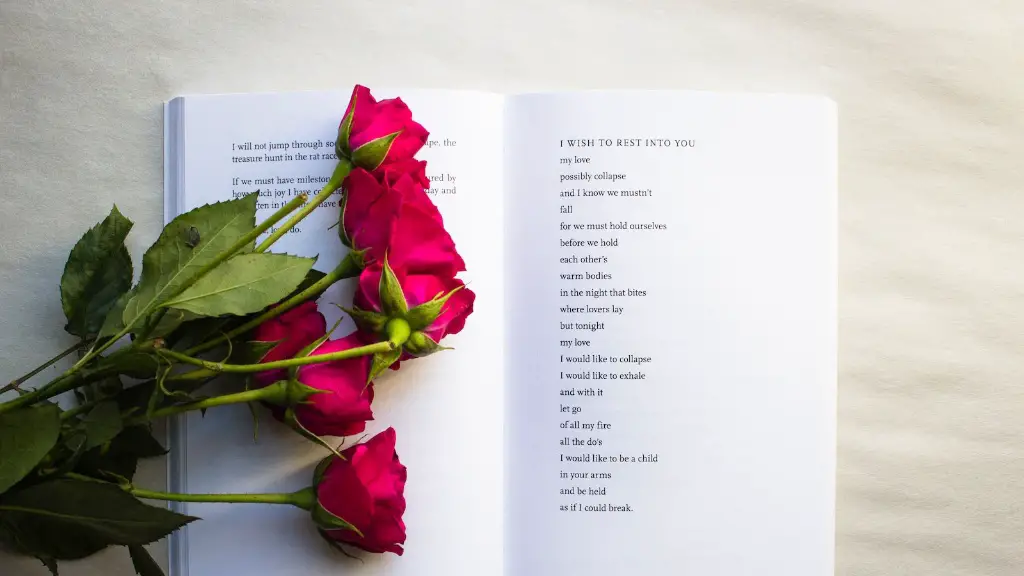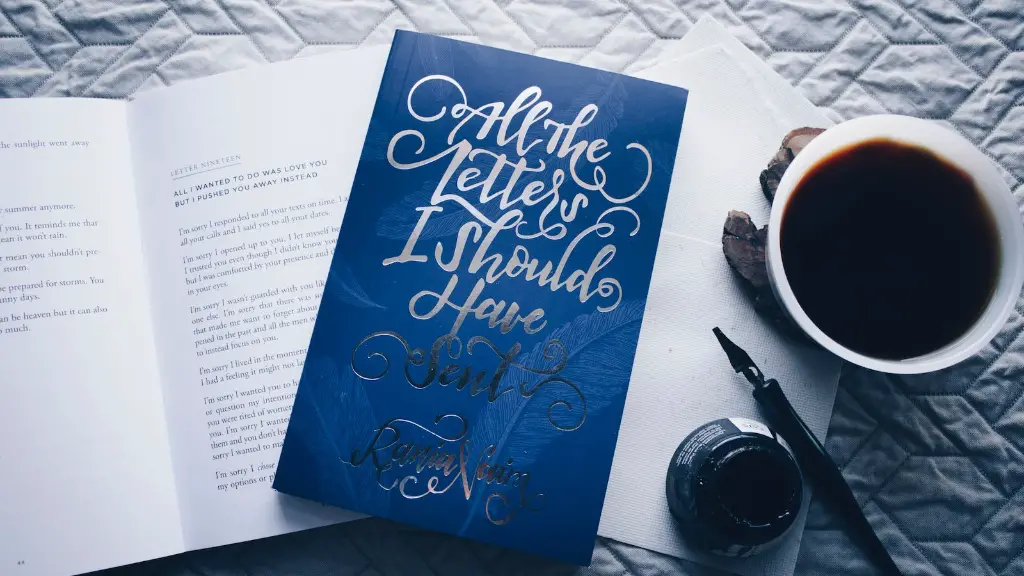What is Poetry?
Poetry is a form of literature that uses aesthetic and rhythmic qualities of language to create a sensual effect. Poetry has a long history, dating back to pre-historic times with the earliest surviving works being found in Ancient Egypt, Greece and India. Poems often use figures of speech, such as metaphor and simile, to convey meaning and create a vivid image in the mind of the reader. Poetry can also use repeated phrases and sounds such as rhyme, alliteration and assonance, to create a pleasing and poetic effect.
Types of Poetry
Poetry can be divided into many different genres and forms, depending on the style, structure, and content. One of the most popular poetic forms is rhyming poetry, which establishes a certain pattern of rhymes at the end of each line. Other popular forms of poetry include lyric poetry, which often expresses the feelings and thoughts of the poet; narrative poetry, which tells a story; and free verse poetry, which does not use any particular rhythmic or rhyme scheme.
The Purposes of Poetry
One of the main purposes of poetry is to explore and express the human condition. Modern poets often use their words to comment on social issues such as inequality, injustice, and poverty. In addition to expressing the views and opinions of the poet, poetry can also offer an insightful commentary on the human condition. For example, early Roman poet Virgil wrote about the fall of the Empire, while Romantic poets such as William Wordsworth used their poetry to comment on society’s changing attitudes towards nature.
Moreover, poetry can also be used to convey a message of love, hope, and inspiration. Poets often choose words to evoke strong emotions in the reader, thus giving the reader a unique and powerful experience. One of the most famous poets to do this is William Shakespeare, whose poem ‘Sonnet 18’ is renowned for its ability to evoke strong feelings of love and admiration in the reader.
The Benefits of Poetry
The beauty and power of poetry can be uplifting and inspiring, as it encourages people to think more deeply and reflect on their lives and the world in which they exist. Reading and writing poetry can help to expand the reader’s vocabulary, as well as helping them to understand and appreciate the beauty of the written word. Poetry can also help to evoke powerful emotions, such as sadness, joy, empathy and wonder.
Furthermore, the study of poetry can be highly beneficial for students. It encourages students to express themselves more freely and openly, as it encourages them to be creative in their writing and to think about how words and language can affect a reader’s feelings. At the same time, studying poetry can help students to become more literate and knowledgeable as it teaches them about different poetic devices, such as figures of speech and image.
Modern Poetry
Modern poetry has evolved in many different ways since its birth in ancient times. It can now take many different forms, such as slam poetry and spoken word, which involve the poet expressing themselves in a frenzied and theatrical way. Through the use of technology, individual poets can create digital poetry, as well as creating music to accompany their spoken words. Moreover, blogs and websites have made it easier for young poets to share their work and gain exposure to a larger audience.
At the same time, modern poetry has become more inclusive, as more and more women have become involved in the writing process. Female poets have become increasingly vocal about the issues faced by women, such as gender inequality, sexism and discrimination. This has given hopes to many female writers to be able to express themselves more freely, thus giving their work a more unique and powerful voice.
The Impact of Poetry on Society
Poetry has had a tremendous impact on society throughout history, as it has been a form which has given a voice to those who have been neglected and unheard. For example, in the African American community, poets such as Langston Hughes, Maya Angelou and Audre Lorde have used their writing to highlight the struggles and discrimination faced by African Americans.
Today, poetry has become an even more important form of expression, as it has become a tool of protest and resistance. For example, the Black Lives Matter movement has made use of poetry to express their feelings and support the movement, highlighting the power of poetry in the modern world. Poetry has also been utilised by many mental health campaigns, as it can be used to express the deep emotions and feelings of those who have lived with depression, anxiety and other mental health issues.
Using Poetry as a Creative Outlet
In addition to its use in protest and societal comment, poetry can also be used as a way to release difficult emotions and explore difficult topics. Without the restriction of structure or grammar rules, poetry gives individuals a chance to express themselves freely and on a deeper level. Poetry can be a cathartic experience, as it allows individuals to express the emotions that they may not be able to express in their everyday lives.
Writing poetry can also be a great form of therapy, as it allows individuals to express their thoughts and feelings in a creative and unique way. Through poetry, people have the ability to express themselves more freely, thus giving them a healthier emotional outlet. Moreover, writing poetry can help to improve one’s emotional wellbeing and foster feelings of self-esteem, which can lead to overall mental health benefits.
Conclusion
Overall, poetry is an incredibly powerful and versatile form of expression that has the potential to both relate to and affect the reader in many different ways. It can be used to convey messages of love, hope and social commentary, as well as providing a creative and therapeutic outlet. As society has evolved, so too has poetry and its ability to provide a voice to those who may not otherwise have one.


